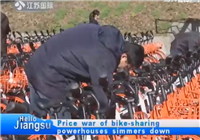The price war between China’s bike-sharing powerhouses Mobike and Ofo appears to have simmered down as the firms stop offering their services for next to nothing.
Both providers were running less than 5 yuan monthly memberships until recently, when they returned prices to 20 yuan. Quarterly, semi-annual and yearly plans are all charged at the same monthly rate.
As the services become more expensive, users are complaining that the riding experience doesn’t meet the increased price. Several consumers said that issues with bikes are common, which make journeys troublesome and affect their mood, the report said. The hikes aren’t surprising now the two companies have a solid user base, but they must be cautious about flexing their monopolistic position, one industry expert said.
Ofo, officially Beijing Bikelock Technology Co., said it was changing the way it offered discounts and would still be offering giveaways such as free weekly cards and coupons. However, consumers still feel let down, the report added.
While the sector’s two largest firms turn an eye to actually profiting from their core service, lower-level players, such as Shanghai Junzheng Network Technology Co. or Hellobike, are still offering bike sharing for 2 yuan a month. Its longer plans cost half the price of those run by Ofo and Beijing Mobike Technology Co.
Last year, bike sharing took off in China, with dozens of bike-share companies quickly flooding city streets with millions of brightly colored rental bicycles.
However, the rapid growth vastly outpaced immediate demand and overwhelmed Chinese cities, where infrastructure and regulations were not prepared to handle a sudden flood of millions of shared bicycles.
Riders would park bikes anywhere, or just abandon them, resulting in bicycles piling up and blocking already-crowded streets and pathways.
As cities impounded derelict bikes by the thousands, they moved quickly to cap growth and regulate the industry.
Vast piles of impounded, abandoned, and broken bicycles have become a familiar sight in many big cities.
As some of the companies who jumped in too big and too early have begun to fold, their huge surplus of bicycles can be found collecting dust in vast vacant lots.
(Source: Jiangsu International Channel)






